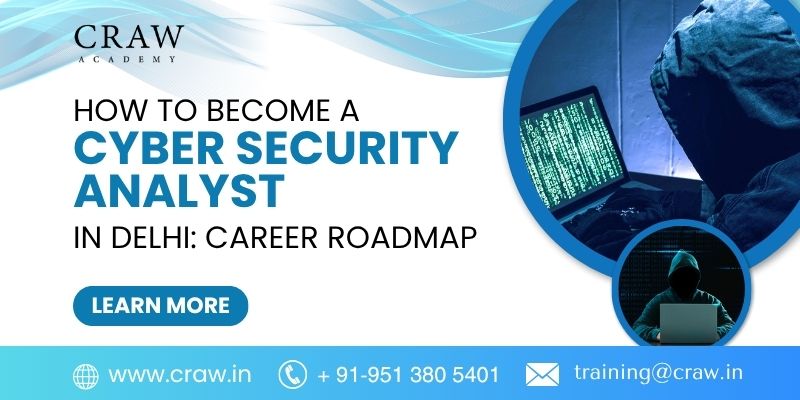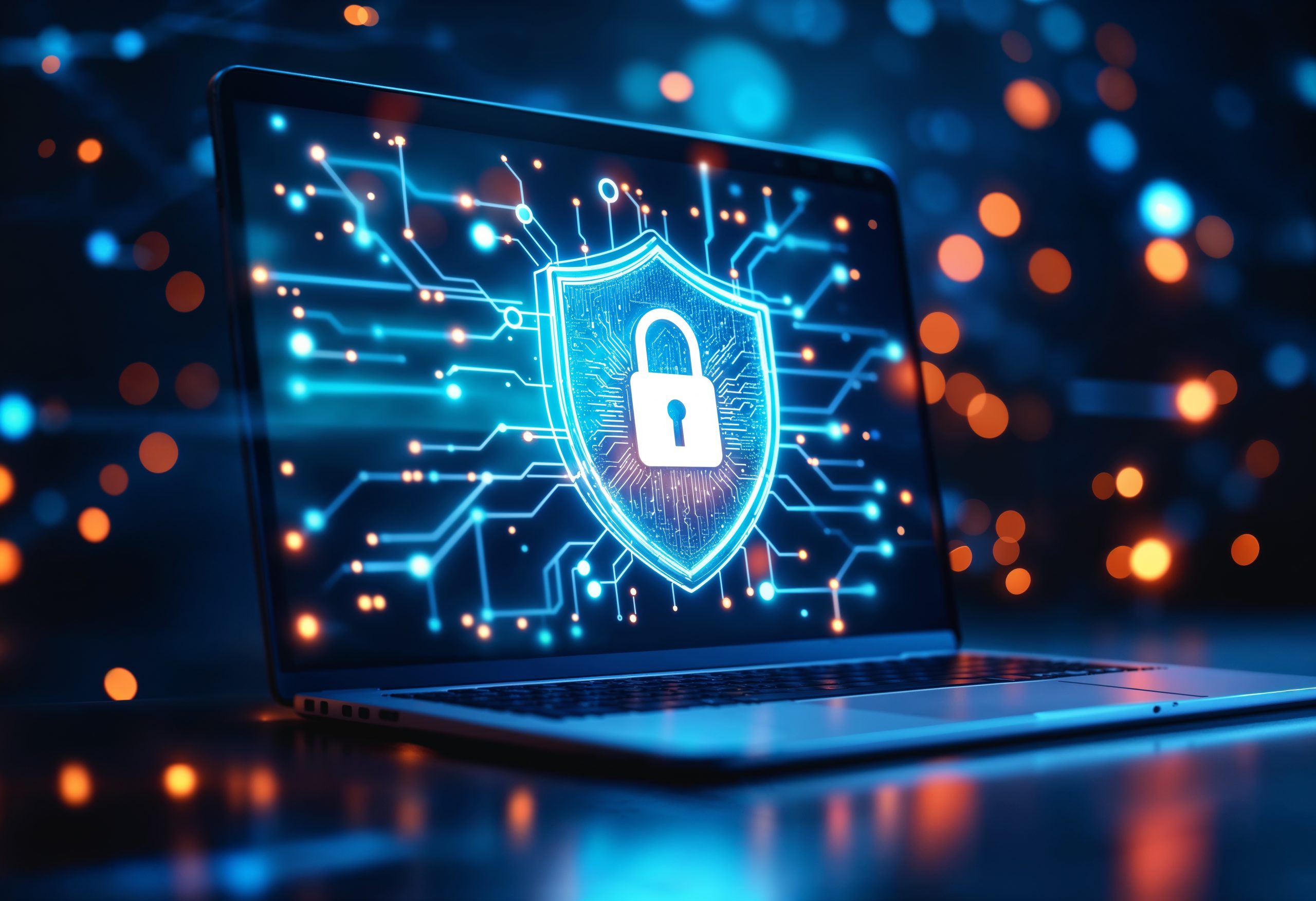Introduction: How to Become a Cyber Security Analyst in Delhi
If you’re based in Delhi and wondering how to build a successful career in this booming domain, you’re in the right place. This comprehensive guide will walk you through the Cyber Security Analyst career roadmap how to become a cyber security analyst in Delhi—from the skills you need and the certifications you should earn, to the best institutes for training and the job opportunities available in 2025.
In an age where digital threats are growing more sophisticated, cyber security has become a mission-critical function for businesses, government bodies, and individuals alike. With Delhi emerging as a prominent tech and startup hub, the demand for skilled cyber security analysts is at an all-time high. From protecting confidential data to responding to cyberattacks, these professionals play a vital role in securing digital infrastructure.
Your Future Starts Here – Reserve Your FREE Demo Class Now!
Who is a Cyber Security Analyst?
A cyber security analyst is a professional responsible for safeguarding an organization’s computer systems and networks from cyber threats, data breaches, and malicious attacks. They continuously monitor network activity, identify vulnerabilities, implement security measures, and respond to security incidents.
What Does a Cyber Security Analyst Do?
A Cyber Security Analyst is a professional responsible for protecting an organization’s computer systems, networks, and data from cyber threats such as hacking, malware, phishing, and unauthorized access. They act as digital security guards who monitor, detect, and respond to security incidents before they can cause damage.
Key Responsibilities of a Cyber Security Analyst:
- Monitor Network Activity
Use tools like SIEM (e.g., Splunk, QRadar) to track unusual behavior or intrusions. - Identify Vulnerabilities
Perform vulnerability scans and risk assessments on systems, applications, and networks. - Incident Response
Detect, analyze, and respond to cyber threats, breaches, and attacks in real time. - Implement Security Measures
Configure firewalls, intrusion detection systems (IDS), antivirus tools, and encryption. - Maintain Security Policies
Develop and update security protocols, user access policies, and compliance procedures. - Security Reporting
Generate regular reports on threat intelligence, system status, and vulnerabilities. - Awareness Training
Educate employees on security best practices to reduce internal threats. - Stay Updated
Continuously research new vulnerabilities, threat trends, and hacking techniques.
Some Common Tools Used by Cyber Security Analysts
- Wireshark (Network traffic analysis)
- Nmap (Network mapping)
- Metasploit (Penetration testing)
- Kali Linux (Ethical hacking OS)
- Nessus (Vulnerability scanning)
- Burp Suite (Web app security testing)
Roadmap to Become a Cyber Security Analyst in Delhi
Step 1: Understand the Basics of Cyber Security
To start your journey, you must first understand the core principles of cyber security:
Types of cyber threats
Basics of networks and operating systems
Common attack vectors (phishing, ransomware, malware)
Fundamental security concepts like encryption, firewalls, and authentication
Step 2: Pursue Relevant Education
While a degree is not mandatory, having one enhances your job prospects. You can opt for:
B.Tech/BCA in Computer Science or IT
Cyber Security Diploma Courses
Certifications like CEH, CompTIA Security+
Step 3: Enroll in a Cyber Security Analyst Course in Delhi
Professional training institutes offer hands-on practical courses aligned with industry standards. Craw Security is a reputed name in Delhi offering:
CEH v13 + AI
Diploma in Cyber Security
SOC Analyst Training
Ethical Hacking with Practical Labs
Step 4: Develop Technical and Analytical Skills
A cyber security analyst needs strong technical and analytical skills:
Network security
SIEM tools like Splunk, QRadar
Linux and Windows administration
Threat detection and response
Python or Bash scripting
Risk assessment
Step 5: Earn Recognized Certifications
Certifications improve your credibility and demonstrate your expertise to employers. Some recommended certifications are:
Certified Ethical Hacker (CEH)
CompTIA Security+
Certified SOC Analyst (CSA)
CompTIA CySA+
CHFI (Computer Hacking Forensic Investigator)
Step 6: Build Practical Experience
You need real-world exposure to gain confidence:
Internships with IT firms or government projects
Participate in bug bounty programs or CTF events
Step 7: Apply for Cyber Security Jobs in Delhi
Once trained, start applying for jobs in sectors like:
IT companies and MNCs
Financial institutions
Cybersecurity consulting firms
Government and defense organizations
Why Choose Craw Security in Delhi?
To effectively detect, analyze, and prevent cyber threats, Cyber Security Analysts rely on a wide range of powerful tools. These tools help them monitor systems, analyze vulnerabilities, respond to incidents, and ensure an organization’s digital assets remain protected.Craw Security is one of the most trusted cybersecurity institutes in Delhi. Here’s why it stands out:
- 100% practical and job-oriented training
- CEH v13 integrated with AI
- Flexible batches: online/offline
- EMI options & affordable fees
- Job assistance with resume & interview prep
Top Paying Jobs for Cyber Security Analysts in Delhi NCR

Delhi NCR (including Noida, Gurgaon, and Delhi city) is a growing cybersecurity hub with a surge in demand for highly skilled professionals. MNCs, IT firms, financial institutions, and government organizations are all looking for security talent—and they’re willing to pay top salaries for it.
1. Security Operations Center (SOC) Manager
Job Role: Oversees SOC teams, manages threat detection and incident response strategy.
Skills Needed: SIEM tools (Splunk, QRadar), incident response, team management, compliance.
Average Salary: ₹18 LPA – ₹30 LPA
Top Employers: Accenture, TCS, Infosys, IBM
2. Cyber Security Consultant
Job Role: Advises clients on how to secure networks, applications, and cloud platforms.
Skills Needed: Risk assessment, compliance (ISO 27001, GDPR), pentesting.
Average Salary: ₹15 LPA – ₹25 LPA
Top Employers: PwC, EY, Deloitte, KPMG, Tech Mahindra
3. Penetration Tester / Ethical Hacker
Job Role: Conducts ethical hacking to identify vulnerabilities in systems and applications.
Skills Needed: Kali Linux, Metasploit, Burp Suite, OWASP Top 10.
Average Salary: ₹12 LPA – ₹20 LPA
Top Employers: Infosys, HCLTech, Indian Government Agencies, Bug Bounty Platforms
4. Cyber Security Analyst – Tier 2/3 (L2/L3 Support)
Job Role: Analyzes and responds to complex security threats escalated from Tier 1.
Skills Needed: SIEM, threat hunting, malware analysis, forensic investigation.
Average Salary: ₹10 LPA – ₹16 LPA
Top Employers: IBM, Wipro, Dell SecureWorks, Oracle
5. Cloud Security Engineer
Job Role: Secures cloud platforms like AWS, Azure, and Google Cloud.
Skills Needed: IAM, cloud firewalls, DevSecOps, container security (Docker, Kubernetes).
Average Salary: ₹14 LPA – ₹25 LPA
Top Employers: Amazon, Microsoft, Google, Paytm, Zomato
6. Threat Intelligence Analyst
Job Role: Collects and analyzes data on current and emerging cyber threats.
Skills Needed: Dark web monitoring, malware analysis, MITRE ATT&CK.
Average Salary: ₹9 LPA – ₹18 LPA
Top Employers: Mandiant, Cisco, Deloitte, Public Sector Units
7. Cyber Forensics Investigator
Job Role: Analyzes digital evidence for legal or internal investigations.
Skills Needed: EnCase, FTK, data recovery, cyber laws.
Average Salary: ₹8 LPA – ₹15 LPA
Top Employers: Law Enforcement Agencies, Government CERTs, Private Forensic Labs
8. Application Security Engineer
Job Role: Focuses on secure development, code audits, and vulnerability testing in apps.
Skills Needed: Secure SDLC, static code analysis, OWASP Top 10.
Average Salary: ₹10 LPA – ₹18 LPA
Top Employers: Flipkart, Paytm, Adobe, Nagarro
9. Information Security Manager
Job Role: Develops security policies, manages compliance, and leads security teams.
Skills Needed: ISO 27001, SOC 2, PCI-DSS, audit management.
Average Salary: ₹20 LPA – ₹35 LPA
Top Employers: Banking & Financial Institutions, MNCs, Healthcare firms
10. Chief Information Security Officer (CISO) – Senior Level
Job Role: Leads the entire information security strategy for an organization.
Skills Needed: Enterprise security strategy, risk management, leadership.
Average Salary: ₹45 LPA – ₹1 Cr+
Top Employers: BFSI sector, IT Giants, Startups, Government PSUs
Tips to Land Top Paying Cyber Security Analyst Jobs:
Get Certified: CEH v13, CompTIA CySA+, CISSP, AWS Security, CHFI
Gain Experience: Start with internships or SOC roles
Specialize: Choose a niche—cloud, forensics, app security, or risk management
Learn Tools: Splunk, Burp Suite, Wireshark, Nessus, Nmap, Metasploit
Join Training Institutes: Like Craw Security, for job-oriented hands-on training in Delhi
Hands-On Training for Cyber Security Analysts in Delhi
In the ever-evolving digital age, cyber threats are growing at an alarming rate, and so is the demand for professionals who can counter them. Cyber Security Analysts play a vital role in identifying, analyzing, and mitigating threats that compromise organizational networks and data. But theoretical knowledge alone isn’t enough to tackle real-world cyberattacks.Delhi, as India’s major tech and education hub, offers numerous opportunities for aspiring cyber professionals to gain practical, job-ready skills through live labs, simulations, and real-time threat analysis. Whether you’re a beginner or an IT professional looking to switch careers, hands-on cyber security training in Delhi can equip you with the expertise needed to excel in today’s security landscape.
the need for cyber security analysts who can defend against real-world attacks. Delhi, being a thriving hub for IT and security innovation, offers numerous opportunities for hands-on learning. If you’re looking to become a job-ready cyber security analyst, hands-on training in Delhi is the smartest way to start your journey.
Why Hands-On Training Matters in Cyber Security?
In the world of cyber security, knowledge without practical skills is like having a shield without knowing how to use it. While theory builds the foundation, it’s hands-on training that prepares you to face real-world cyber threats. Whether you want to become a SOC Analyst, Ethical Hacker, or Cyber Forensic Expert, mastering tools and techniques through practice is essential.
Real-World Threats Need Real-Time Solutions
Cyber threats evolve rapidly. From phishing scams to zero-day attacks, no textbook can fully prepare you unless you experience real-time simulations. Hands-on training exposes you to live lab environments, where you learn by doing—detecting, analyzing, and responding to threats just like in real-world job scenarios.
- Detect breaches using real-time monitoring tools
- Perform penetration testing using industry tools
- Analyze malware and forensics data
- Implement preventive security controls
- Write reports on live incidents and vulnerabilities
Key Benefits of Hands-On Cyber Security Training
- Live Exposure to Tools: Gain practical skills in tools like Wireshark, Metasploit, Burp Suite, Splunk, Kali Linux, and more.
- Real-Time Scenarios: Simulate DDoS attacks, phishing, network breaches, and incident response exercises.
- Build Problem-Solving Skills: Understand how to think like a hacker and defend like an analyst.
- Job-Readiness: Employers in Delhi NCR highly prefer candidates who’ve worked on real labs over theory-only learners.
- Boosts Confidence: Experience builds confidence—critical when responding to security incidents under pressure.
Frequently Asked Questions (FAQs)
1. What is the eligibility to become a Cyber Security Analyst?
10+2 background in science/IT and basic computer knowledge. Graduation is beneficial.
2. Can I become a cybersecurity analyst without a degree?
Yes, with the right certifications and practical experience, you can pursue this career without a formal degree.
3. How long does it take to become a cyber security analyst?
Typically 6–12 months with dedicated learning and training from institutes like Craw Security.
4. Is Delhi a good city for cybersecurity jobs?
Yes, Delhi NCR has a high demand for skilled cybersecurity professionals across IT, finance, and government sectors.
5. Does Craw Security offer placement after training?
Yes, Craw Security provides 100% placement assistance and interview preparation.
6. Which certification is best to start with?
CEH v13, CompTIA Security+, and SOC Analyst Certification are ideal entry points.
7. Is cybersecurity a stressful career?
It can be challenging due to critical responsibilities but also highly rewarding and impactful.
8. What tools should I learn?
SIEM tools, Wireshark, Burp Suite, Nmap, Metasploit, Nessus, etc.
9. What is the fee for a cybersecurity analyst course in Delhi?
Depending on the course level, it ranges between ₹30,000 to ₹90,000 at Craw Security.
10. Can I learn cybersecurity online in Delhi?
Yes, Craw Security offers live online training with practical virtual labs.
Conclusion
Becoming a Cyber Security Analyst in Delhi is a smart and future-proof career choice. With structured training, the right certifications, and continuous hands-on practice, you can unlock lucrative job opportunities in India’s cybersecurity sector. Start today with a reputed institute like Craw Security and secure your digital future!





